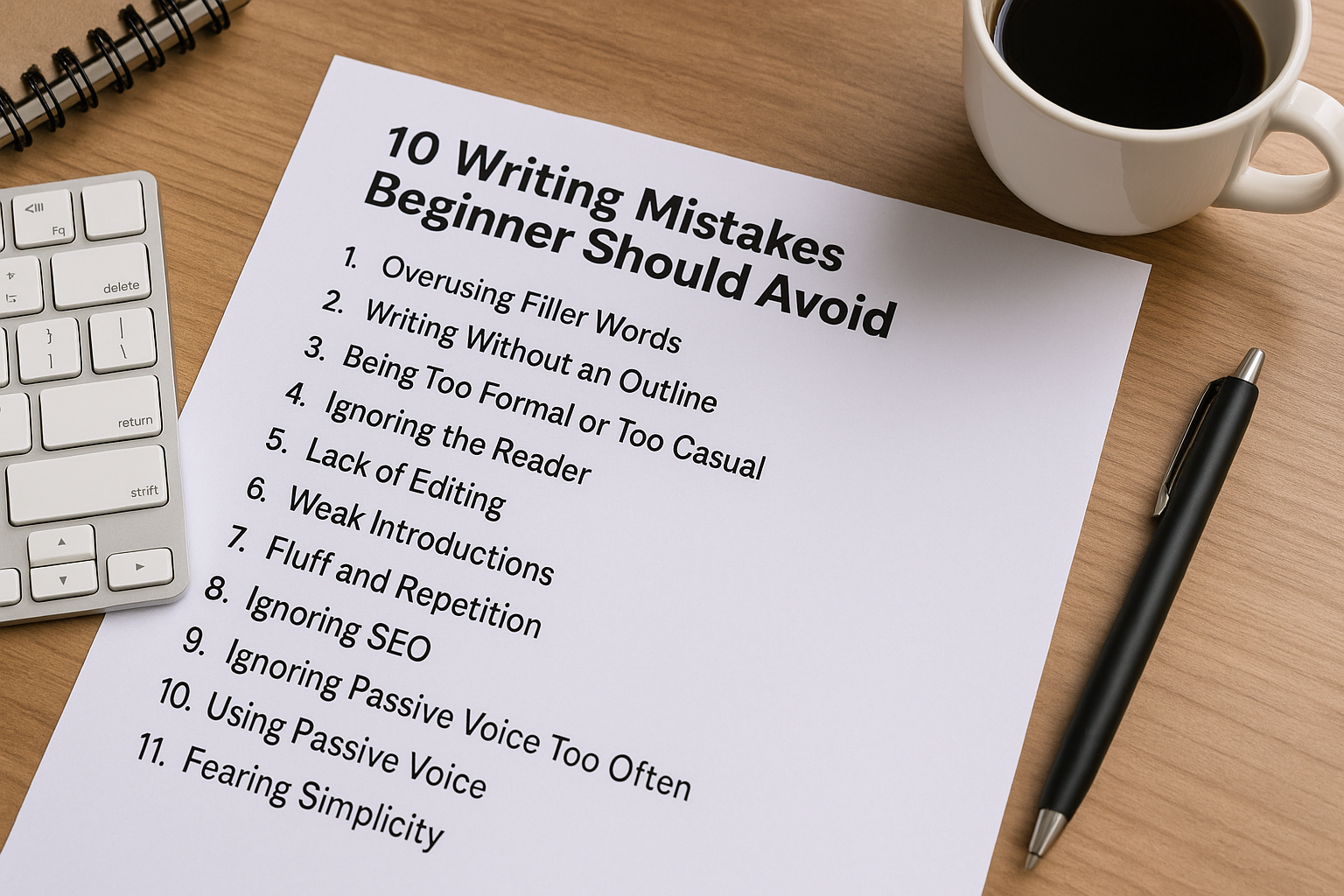Starting as a freelance writer or content creator can be exciting—but it’s also easy to fall into habits that weaken your work. Recognizing and avoiding common writing mistakes can dramatically improve the quality and clarity of your content. Here are ten of the most frequent pitfalls new writers face—and how to steer clear of them.
1. Overusing Filler Words
Words like just, really, very, that, and actually often clutter sentences without adding real meaning.
❌ It’s actually a very good idea to just try writing something simple.
✅ It’s a good idea to try writing something simple.
Tip: During editing, highlight these words and ask: “Does this word add value?” If not, cut it.
2. Writing Without an Outline
Jumping straight into a blog post or article without a structure can lead to confusing content. Without a roadmap, your ideas might lack flow or coherence.
Tip: Spend a few minutes outlining:
- Your headline
- Key sections (usually 3–5)
- Bullet points under each section
Your future self will thank you.
3. Being Too Formal or Too Casual
Beginners often swing too far in one direction—either trying to sound academic or using an overly conversational tone.
❌ Utilization of strategic methodologies can be implemented…
❌ Heyyy guys!! So like, here’s the deal lol
✅ Here’s how to apply practical writing strategies to your work.
Tip: Aim for a professional, friendly tone that fits your audience and platform.
4. Ignoring the Reader
Many beginners write as if they’re talking to themselves instead of solving a problem for the reader. Your audience wants helpful, clear answers.
Tip: Use the second person (“you”) and ask yourself:
- What does my reader want to learn?
- What problem am I helping them solve?
- How can I make this easier for them?
5. Lack of Editing
Writing and publishing without revising is one of the biggest red flags. Typos, repetition, and weak sentences reduce trust and professionalism.
Tip: Always do at least two rounds of editing:
- Structural edit: Improve flow and logic
- Grammar & style edit: Fix typos, reword awkward phrases
Tools like Grammarly or Hemingway Editor can help, but nothing beats reading aloud.
6. Weak Introductions
If your introduction doesn’t grab attention or clearly state the value of the article, most readers will leave.
Tip: Start with:
- A relatable problem
- A bold statement
- A surprising fact or question
Then explain what the article will help them achieve.
7. Fluff and Repetition
Repeating the same idea with different words or adding unnecessary sentences makes your writing feel shallow.
Tip: Ask yourself:
- “Did I already say this?”
- “Can I combine these ideas?”
- “Is this sentence really necessary?”
Every sentence should push the article forward.
8. Ignoring SEO (Search Engine Optimization)
If you’re writing online and want your work to be found, SEO matters. Beginners often ignore keywords, meta descriptions, and search intent.
Tip: Use free tools like:
- Google Keyword Planner
- Ubersuggest
- Answer the Public
And always write for humans first, not just search engines.
9. Using Passive Voice Too Often
Passive voice weakens writing and makes it harder to read.
❌ The article was written by the freelancer.
✅ The freelancer wrote the article.
Passive voice isn’t always bad, but active voice is clearer and more direct.
10. Fearing Simplicity
New writers sometimes believe “sounding smart” means using complex words and long sentences. But the best writing is usually the simplest.
✅ Use short sentences. Write clearly. Choose familiar words.
Simplicity shows confidence and clarity—traits every good writer needs.
Wrapping Up: Clarity Wins
Avoiding these ten mistakes will instantly raise the quality of your writing. You don’t need to be perfect—you just need to be clear, helpful, and intentional.
Remember: writing is a skill. Like any skill, you improve by doing the work and learning from your missteps. Now that you know what to avoid, you’re already ahead of most beginners.
Stay focused, keep practicing, and write like your words matter—because they do.
